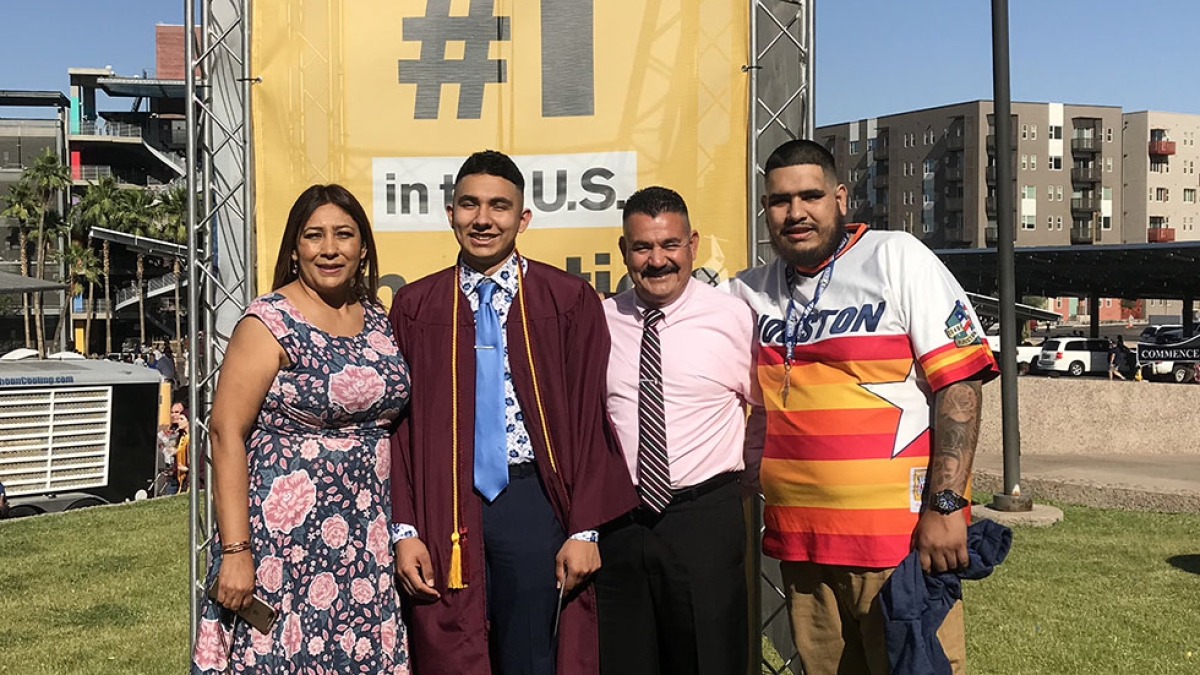History graduate explores interests in communication, political science

Alejandro Hernandez, who graduated from New College with a bachelor’s degree in history with minors in communication and political science this spring, poses with his family.
Editor's note: This story is part of a series of profiles of notable spring 2022 graduates.
Alejandro Hernandez’s passion for history goes as far back as his childhood, when he watched the Indiana Jones movies and the History Channel. His interest in history was further explored and encouraged in high school.
“In high school I had two great teachers who pushed me to continue my interest in history,” Hernandez said. “One of the great things about history is that it gives you a blueprint of how things happened back then, but also how things might go in a certain direction.”
After high school, first-generation student Hernandez toured ASU’s campuses around the Valley, but found himself drawn to the New College of Interdisciplinary Arts and Sciences on the West campus.
“I was just amazed at first at … how peaceful it was,” he said. “I can actually hear the birds chirp and that surprised me. I even told my mom about it and I said ‘I can get used to this!’ Ever since then I just stuck here at New College.”
During his time at New College, he said he was able to learn new perspectives through the diversity he found among the student body.
“So many different people are coming here from so many different places. There’s a lot of people from California, there's a lot of people from international places, there's people coming from other parts of the U.S.,” he said. “Getting to know them kind of gave me a new lens or perspective so I may see things differently.”
This spring, Hernandez graduated from New College with a bachelor’s degree in history with minors in communication and political science. Here, he shares more about his experiences at ASU and what’s next for him.
Question: Which professor taught you the most important lesson while at ASU?
Answer: I have so many professors that were great here but I would say Jay Taylor. I had him for a Kindness and Interpersonal Relationships class and also a Forgiveness and Reconciliation class. It was very philosophical but also more like an actual conversation about what these terms mean. Coming from a Hispanic family I was raised to believe that it's black and white — there's a wrong, there's a right — that's it there's no middle ground. But I learned a lot when it comes to forgiveness and kindness. As people we have so many capabilities that are yet to be discovered. By learning to apply my knowledge on forgiveness I feel like I’ve been able to help my family out a lot and right now they're doing a little better emotionally.
Q: What was your favorite place or spot on the West campus for studying or meeting friends?
A: My two favorite spots are the Sun Devil Fitness Complex and the Fletcher Library. The gym is the most must "to do" thing for me, so going there is a good way to de-stress and it's a good way to talk to people. A lot of people here on the West campus go to the gym at some point so you get to see people from class. It's a good way to come together to work out but also to talk and catch up with people. Fletcher library is a very quiet place for me. I'll go to the computer and do all my work, whether it's reading chapters for class, preparing for a speech or working on an assignment.
Q: What's the best piece of advice you would give to someone still in school?
A: Break everything down for yourself. I know we're so accustomed to trying to figure out everything at once, but just like with anything there's a process. Within that process, you want to break things down and try to slow things down for yourself. The slower things are for you the more manageable it will be. I would also say try to befriend the upperclassmen. Those upperclassmen will give you great advice and tell you about their experiences so you can learn from them.
Q: What are your plans after graduation?
A: After graduation I'm considering going to graduate school for social justice. As a first-generation student it's a new process for me so it's going to take time but I'm definitely considering it. I also want to continue my internship that I currently am a part of with Public Allies Arizona.
Q: Where do you see yourself in 10 years or more?
A: Hopefully I'll either be a historian or working in the government. I feel like being part of the local government is a way for me to remind myself of my roots because originally I'm from Los Angeles, California, more specifically the Florence area, which is predominantly a low-income Hispanic and Latino community. It has a history of gang violence and drugs. Working with the government would be my way of reminding myself I am a product of that and helping out as many people as I can.
More Law, journalism and politics

5 takeaways about artificial intelligence and elections
Next year’s midterm elections are happening at a crucial time in the adoption of AI, with concerns that the new technology could…

ASU dominates Rocky Mountain Emmys, showcasing range of talent
Arizona State University stole the spotlight at the Rocky Mountain Southwest Emmys, walking away with an impressive haul of shiny…

New First Amendment Academy empowers citizens with knowledge about 5 core freedoms
According to a 2024 survey, there is widespread misunderstanding among many Americans around the nuances of the First Amendment.…